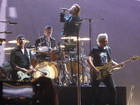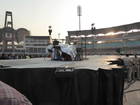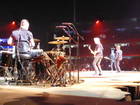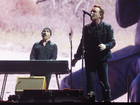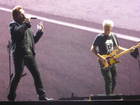U2 October Tour
October 4th leg: North America
: Opry House - Austin, Texas, USA
Breaking Barriers With Christ and Rock
Margaret Moser (published on 1982-02-19)Source: Austin Chronicle
BY MARGARET MOSER
It was chilly outside Saturday night, but inside the Opry House, the Irish band U2 had worked themselves and their audience into a sweat. With a group spirit rarely seen in larger concert halls, Austin rejoiced with the four young men from Dublin. Chronicle staffers spoke before the show with bassist Adam Clayton and lead singer-songwriter Bono Hewson.
Austin Chronicle: On the last tour you mentioned putting together a compilation album of American groups you liked. Whatever happened with that?
Bono Hewson: When we were on tour of the U.S., we found, as we used to find in Ireland, that there would be a lot of U.S. bands imitating European bands, just as European bands used to imitate U.S. bands. When we found a U.S. band that had its own identity and was just beginning, we always took notice. But we're only thinking about the album. We're playing with the idea, you might say.
Adam Clayton: We've also been very busy, and haven't had any time to do it. When we got back from America the last time, we went and recorded October. After that, we went out on British and American tours, then did the first half of this American tour. We got home for Christmas, and here we are again.
BH: With that kind of schedule, you either take off some time to do personal projects, or you leave out half of Europe.
AC: How has October been received?
BH: I think it's fourth album of the year in NME.
AC: You also placed two albums [Boy, October] in this year's Village Voice poll, so you really are a critics' favorite.
BH: Well, we are and we aren't. Sometimes a critic -- a person that has their ear to the ground -- is often aware of what we're doing, because they're one step ahead of the posse. Because they're aware, an understanding of what we're doing follows. We've just had a lot of acclaim, but there are others who just want to go away at the sight of us.
AC: But you've never been reviled in print.
BH: I'm sure it will happen someday. We've gotta be thankful for the sort of reception we've had in the press, because it's an important way to get across to the public.
AC: I've seen your lyrics attacked as being simplistic.
BH: All my lyrics are autobiographical. If writing about myself isn't important enough, that's really a blow to the ego. But I find that writing about myself and the things that affect me is the only honest way I have of communicating, rather than writing about issues, like Northern Ireland.
AC: I think that what makes an artist popular is people being able to share the experience of the lyrics. That's why I dislike musicians who claim that what they sing isn't important, because that's simply not true.
Clayton: I think the essence of communication is simplistic anyway. You must be able to cross racial, class, and age barriers, and to do that, you must approach people emotionally, not intellectually. Emotions are very complex things, but the triggers of emotions are quite simplistic. That's the way Bono approaches what he does.
AC: Your music is very emotional, and it strikes a chord in me.
BH: That's the most important thing you could say to me. That is success. That's communication, and it's all you really want. It sinks in, and takes on different forms -- it's the trigger. If it affects you, good; if not, we're not the band you want. We don't believe in posing, we don't hide behind our haircuts. We don't stand in the shadows of the stage and stare at our feet. We try to approach the audience -- like the last time we played Austin, it was a wonderful experience.
AC: I also saw you in Houston last year.
BH: Yes, we got a present from someone in the audience in Houston and we thought, "Aren't these Houston people nice!" We opened it up and it was a pair of earplugs.
AC: I understand that your music is based on classical music.
BH: What we do is very instinctive, and it's classical by nature, not by form. It's not like three-minute pop, but at the same time, we don't like that big dinosaur "classic rock" tag. But, indeed, a tutor of ours tutored us in Renaissance music. He's teaching at NTSU in Denton now. A lot of people see the classical influence in our music, but it's no big deal, and it certainly isn't planned. I often find critics know much more about music than I do. I think John Lennon once said that he learned how he wrote songs by reading it from critics.
AC: I think that writers are jealous because they don't have that musical instinct.
BH: I think the best piece about U2 is a piece where I learn something about the band. It's their insight that I like. It's good because I don't write story songs that you hear once and then don't want to hear again. I use images -- they spark off an atmosphere. The meaning of songs, since they took a long time to come out of me, just sinks into people and takes on different meanings for different people. I think that's good. We've also been accused of not being specific enough in our lyrics.
AC: It's specific enough for me, because I've been through a lot of the same things that you describe in your songs. It fits my different moods.
BH: It's an atmosphere. I listened to October after I hadn't listened to it for a while, and I was floored. I couldn't believe that I was part of the record. It made me feel very warm inside.
AC: I'm curious to know what "Gloria," in particular, is about.
BH: It's not about a girl.
AC: No, it's more like an incantation, or a Gregorian chant.
BH: You hit it on the button. I believe in God. I'm a spiritually oriented person. I don't consider myself a very religious person, in the cliched sense of the word. But I have a very strong belief in God, and I can't express that. And the song goes, "I try to sing this song," because I can't sing it. It ends up resorting to a Latin chant. That's how people have expressed it in the past.
AC: Is it difficult to express your feelings about religion because of the way people react to it?
BH: "Religion" is a word that people react to very negatively, probably for the right reasons. I come from a country where religion has cut the country in two, has set one ethnic group against another. Therefore, I've no time for religion. I think Jesus Christ can actually break down barriers. When I see barriers coming up in religion, that's when I worry. Also, in this country, there's some very right-wing connotations of religion.
AC: Like the Moral Majority.
BH: I don't want to judge them because I don't know them. My own impression is that they seem a right-wing group. But it's love that's the root of it all. Without love, what are we? Whatever amount of truth there is, without love or empathy, I've no time for it.
AC: But you must understand that you come across very differently from most Christians. I don't know if it's conscious or not, but you've sort of broken the mold.
BH: I've no time for molds of any sort. People who book us ask, "Are you a punk band?" We say, "Don't call us a punk band or we'll spit in your eye!" I hate molds. The band is four people. We're U2; we want to be taken as U2. We believe that we have an originality in our sound and our approach. I think most people have got to be themselves. They shouldn't compromise what they believe to suit a mold.
AC: I don't like born-again Christians who feel that everyone around them must convert once they have.
BH: It just comes through love, really. Some have big mouths and can't shut up, and that's an indication of what's happening inside them. It can be distressing when you're on the other end, but I'm sure it's for the right reasons in them.
AC: You said earlier that you don't have time for the situation in Northern Ireland. Surely it must affect you in one way or the other.
BH: It affects me in that I fear divisive forces. But I have a deep belief in the people of my country; I have a great love for them. That's why we live there, and not in London or New York. We have strong roots there. That's why it was so difficult to leave this time. Whenever there's violence in a country, there's also a joy of sorts. We've played some of our best concerts in Belfast. They're really joyful people. Whenever they come to our concerts -- Protestants, Catholics -- they forget about the violence. It's a uniting force. That's the greatest thing about music. Music breaks barriers, it shouldn't make them.
--------------------------------------------------------------------------------
Originally printed in The Austin Chronicle, February 19, 1982. Written with assistance from Alice Berry and E.A. Srere.
Often plagiarised, never matched.
